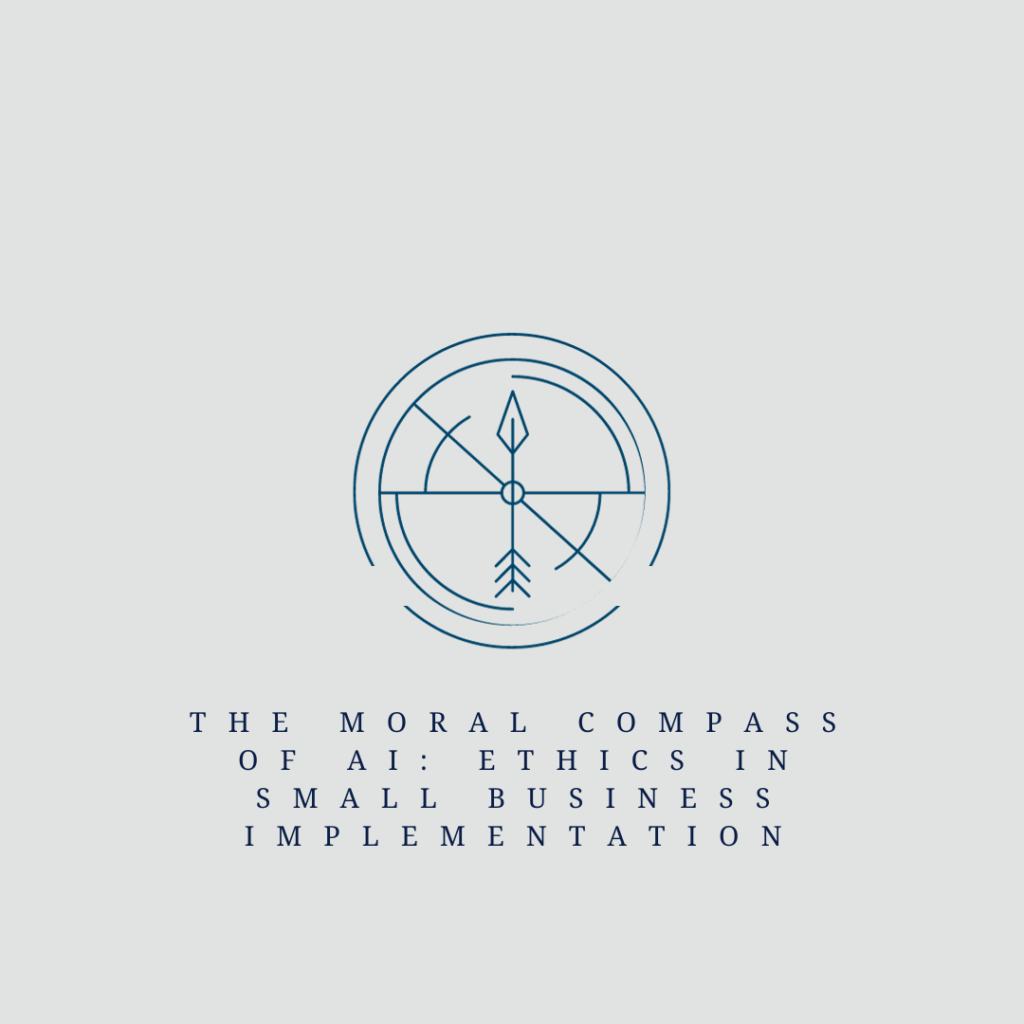Artificial Intelligence (AI) is transforming the way small businesses operate, offering them cost-effective solutions to improve efficiency, customer engagement, and decision-making. However, this adoption of AI also raises important ethical considerations. As small business owners explore how to implement AI into their operations, it’s important to dive into the ethical dimensions of its use and understand how to harness this technology in a way that preserves business values and responsibilities while leveraging the power of AI.

Empowering Small Businesses
AI technologies offer small businesses numerous advantages, including automating routine tasks, enhancing marketing strategies, and making data-driven decisions. AI-driven automation can significantly boost a small business’s productivity, allowing them to allocate resources more efficiently and focus on strategic growth. For example, the use of AI-powered recommendation systems and chatbots can provide customers with personalized experiences, improving satisfaction and loyalty. These benefits, however, must be balanced with ethical principles to ensure responsible AI usage.
Ethical Considerations in AI Adoption
Small businesses must navigate ethical concerns when adopting AI technologies to avoid potential pitfalls and maintain trust with customers, employees, and stakeholders.
Transparency and Accountability
Small businesses should be transparent about their use of AI, clearly explaining how it impacts customers and employees. Companies can demonstrate this commitment to transparency by adopting AI policies that clearly outline when AI can and can’t be used. These policies discuss which platforms can be used and what information can be used with the AI. Developing internal policies can help establish accountability mechanisms to address AI-related issues and errors promptly, leading to minimized risk exposure for the company.
Not only should businesses be concerned about the transparency of the use of AI within their own company, they should also consider its use by their 3rd party vendors. Any information provided to another business could be used in their AI platforms. Businesses can and should address this usage in their third party contracts. Business owners should ensure that both they and their 3rd party vendors are transparent about the use of AI, which information is used and who is responsible for any breaches of the use of information.
Data Privacy and Security
One of the highest obligations of a business is to safeguard customer and employee data rigorously. Regardless of whether AI is used, all businesses must adhere to data protection laws and maintain strict security measures to prevent data breaches. The use of AI can complicate a company’s data privacy and security measures.
Companies using their customers’ information must be transparent about data collection and allow customers to opt out. While in some states, the ability to opt out of certain uses of AI is discretionary, under the recently enacted Colorado Privacy Act, businesses must allow consumers to opt out of any profiling activity that furthers automated decisions. This means that Colorado businesses using their consumers’ information in connection with any form of AI need to provide their consumers this option to opt out.
If a company chooses to use AI surveillance tools, it should take steps to respect employee privacy when implementing those measures. Employers should clearly communicate how these technologies are used and allow employees to voice concerns.
Fairness and Bias
A rising concern among AI developers is the ability of the AI to act in a fair and unbiased manner. It is imperative for both developers and users of AI to ensure the algorithms used are fair and unbiased. Biased algorithms can lead to discrimination and negatively impact customer trust and brand reputation.
For example, small businesses often use AI in recruitment, employee management, and performance evaluations. Ethical considerations must guide these processes to create a fair and inclusive workplace.
The value of a company’s AI is only as good as the information that was used to build the AI. If an AI-based hiring tool is built with biased information, it is likely that the results it produces are not free from bias. Consider and AI- based hiring tool used in video hiring situations. The AI tool will deny an application if it can not understand the candidate’s speech. So, if a well-qualified candidate has a speech impediment, the AI tool could inadvertently discriminate against the candidate, despite the fact that the speech impediment has no adverse impact on their ability to perform the job. Employers are still required to take proactive steps to prevent discrimination during the recruitment process, and can not hide behind AI generated results.
Responsible Marketing and AI
AI can be a powerful tool for marketing, helping small businesses reach their target audience more effectively. However, ethical marketing practices are essential to maintain trust and credibility.
Honesty in Advertising
While honesty in advertising isn’t a new concept, it is a concept that AI may not understand the nuances of. While an advertisement generated by AI may read as technically correct, it may actually mislead customers or exaggerate product capabilities. Business owners must take the time to review the content generated by AI and ensure that it is not misleading or deceptive.
Ethical Environmental Impact
AI technologies, particularly machine learning models, require significant computational power and energy. Small businesses should consider the environmental ethics of their AI usage. Some considerations when looking at the environmental impact of using AI include:
Energy Efficiency: Opt for energy-efficient hardware and cloud providers. Companies may want to consider the environmental impact when scaling AI infrastructure.
Carbon Footprint: It is becoming more common for companies to offset carbon emissions produced by AI operations. Consider carbon offset programs which help contribute to a more sustainable future.
AI and Business Responsibility
Business responsibility ultimately resides with the humans running the business and not the AI the business uses. It’s imperative that business owners maintain human oversight in critical decision-making processes. Businesses should avoid complete reliance on AI, especially in contexts where human judgment and empathy are necessary.
Business owners should also take on the responsibility of staying up-to-date with AI-related regulations and ensure full compliance to avoid legal and ethical issues. While the United States has not enacted comprehensive statutes regarding AI yet, individual agencies and states are starting to issue guidance in limited areas. Reach out to your business attorney to understand how the AI you’re using in your business today correlates with current regulations and state laws. By staying proactive in this area, business owners can dramatically lower the risk profile that AI presents to their business.
Conclusion
AI holds immense promise for small businesses, offering tools that can enhance efficiency, customer engagement, and growth. However, ethical considerations must be at the forefront of AI adoption to ensure responsible and sustainable use. Small businesses must maintain transparency, fairness, and accountability in their AI practices, respecting the privacy and rights of customers and employees.
By adopting ethical AI principles, small businesses can build trust, strengthen their brand reputation, and contribute positively to their communities while harnessing the transformative power of artificial intelligence. In a world where AI is becoming increasingly integrated into daily operations, ethical considerations are not just a choice but a responsibility for businesses of all sizes.
The Law Office of Poorvi B. Parkhie is constantly monitoring the status of AI regulations and how they impact Colorado businesses. Reach out today to schedule an initial consultation and discover how we can help you protect your business.

